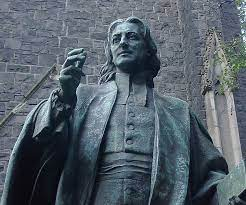Follow URL Link: Posted JAN 2013

https://wesleygospel.com/2013/01/08/no-denominations-in-heaven-the-british-friend/
The British Friend: A monthly Journal, CHIEFLY DEVOTED TO THE INTERESTS OF THE SOCIETY OF FRIENDS.
No. I. Glasgow, 1st Month, 1st, 1863. Vol. XXI.
Page 3:
THE TWELVE GATES OF HEAVEN.
John Wesley’s Dream.
“The city had twelve gates, on the east, three gates; on the north, three gates; on the south, three gates; and on the west, three gates; . . . and in the midst of the street, and on either side of the river of life, was there the tree of life, which bare twelve manner of fruits, and yielded her fruit every month: and the leaves of the tree were for the healing of the nations” (Rev. xxi. 12, 13; xxii. 2).
These words are figures, but they are figures of a great truth. They represent to us the variety, the diversity of heaven. They express in an outward picture what our Saviour said, also under a figure, though more simply, “In my Father’s house are many mansions.” We do not know whether “those that shall be saved will be few or many.” It may be that those who are able to struggle through the strait gate will be very few. It may be that the good, and the true, and the just will be in a minority in the next life, as they usually are in this life. But whether few or many, the Bible reveals to us most clearly the truth which our carnal, narrow hearts are very unwilling to receive — namely, that amongst the good, whom we hope to meet in heaven, there will be every variety of character, taste, and disposition. There is not one “mansion” there, but “many”. There is not one “gate” to heaven, but many; there are not gates only on the north, but “on the east three gates, and on the west three gates, and on the south three gates.” From opposite quarters of the theological compass, from opposite quarters of the religious world, from opposite quarters of human life and character; through di£ferent expressions of their common faith and hope, through different modes of conversion, through, different kinds of instruction and teaching, through different portions of the Holy Scriptures — will the weary travelers enter the Heavenly City, and meet each other — not without surprise — on the shores of the same river of life. And on those shores they will find a tree bearing, not the same kind of fruit always and at all times, but “twelve manner of fruits,” for every different turn of mind — for the patient sufferer, for the active servant, for the holy aud humble philosopher, for the spirits of just men now at last made perfect; and “the leaves of the tree shall be for the healing,” not of one single church or people only, not for the Scotsman or the Englishman only, but for “the healing of the nations” — the Frenchman, the German, the Italian, the Russian — for all those from where, it may be, in this world its fruits have been farthest removed, but who, nevertheless, have “hungered and thirsted after righteousness,” and who, therefore, shall be filled.”
And here, again, let me tell a third tale of the dark night, which shows how the light of the other world, in this its most evangelical aspect, dawned upon the soul of a great teacher amongst ourselves. It is said that John Wesley once, in the visions of the night found himself, as he thought, at the gates of hell. He knocked, and asked who were within. “Are there any Roman Catholics here?” he asked. “Yes,” was the answer, “a great many.” “Any Church of England men?” “Yes, a great many.” “Any Presbyterians?” “Yes, a great many.” “Any Wesleyans?” “Yes, a great many.” Disappointed and dismayed, especially at the last reply, he turned his steps upwards, and found himself at the gates of Paradise, and here he repeated the same questions. “Any Wesleyans here?” “No.” “Any Presbyterians?” “No.” “Any Church of England men?” “No” “Any Roman Catholics?” “No” “Whom have you, then, here?” he asked in astonishment. “We know nothing here,” was the reply, “of any of those names that you have mentioned. The only name of which we know anything here is ‘Christian’; we are all Christians here, and of these we have a great multitude which no man can number, of all nations, and kindreds, and peoples, and tongues.”
Advertisements
https://c0.pubmine.com/sf/0.0.7/html/safeframe.html
REPORT THIS AD
Yes, we shall be obliged in heaven to meet with Christians, with good men, of very different opinions. Had we not better prepare for that meeting by consenting to meet with them on earth? We shall be obliged there to make little of our differences, to put up with diversity of opinions, and ranks, and pursuits. Had we not better moderate our differences here, and bear and forbear with these diversities in this world? Is it not a waste of time to try to force all our fellow travellers through our own gate now, when we shall be obliged hereafter to welcome those who enter from the western gate, though we have entered from the eastern, and those who have entered from the southern gate, though we have entered from the northern?
How wide the gates of heaven stand open — how many different characters will be found amongst the elect, will best appear if we read these passages: —
Ps. lxxvii. 3-7; cxix. 96; Isa. lx. 11; Luke xiii. 28, 30; xiv. 22, 23; xv. 7; xxiii. 42, 43; John x. 16; xiv. 1, 2; Rom. ii. 14-16; xiv. 1-8; 1 Cor. xii. 14-21; Rev. vii. 9; Xii. 24, 25. — Good Words.
